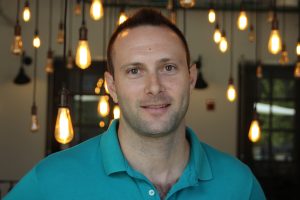
As part of its efforts to develop student talent across the university, Johns Hopkins Technology Ventures has enhanced its fellowship program.
JHTV’s Commercialization Academy gives students a firsthand look at the business of science as they pursue interests in research, entrepreneurship or both.
“As students are emboldened and learn more facets about how research gets out into the world, they get a better sense of their own opportunities,” says Sam Hopkins, who in the spring was named JHTV’s first Commercialization Academy manager.
Hopkins received a global Master of Business Administration from the Johns Hopkins Carey Business School, where he was first exposed to research commercialization through its “Discovery to Market” curriculum, which focuses on taking ideas from lab to market. He then served as a postgraduate fellow for the Army’s Institute of Surgical Research, where he worked on technology transfer and commercialization projects. He was attracted to the JHTV position in part, he says, to help strengthen the experience and education of fellows who want to participate in research commercialization much like he did.
The Commercialization Academy accepts students from undergraduates to postdocs for one or two years. (“All types of brains are helpful,” Hopkins says). Fellows must commit to working at least eight hours per week at JHTV, but their work schedule is built around their academic one.
The academy accepts fellows in fall and spring cohorts. The deadline to apply for the fall cohort is Sept. 30.
In addition to receiving technical training, fellows are exposed to real-world commercialization scenarios and have frequent brown bag lunches with inventors, investors and JHTV staff.
“As Johns Hopkins continues to encourage students to pursue entrepreneurship, integrative learning, and diverse careers, we are doubling down on student experiences at JHTV,” says Liz Burger, senior director of strategic initiatives.
The Commercialization Academy is mutually beneficial, Burger added. Students gain experience that can help in their research or future careers, with some fellows having gone on to work at Stryker, Venture for America, the U.S. Food and Drug Administration, and various intellectual property and venture capital firms, among other organizations. Others have founded Johns Hopkins spinouts, including emocha Mobile Health.
JHTV, meanwhile, gets assistance with its mission of translating discoveries into accessible technologies and, in some cases, future employees: About a half-dozen JHTV staffers started out in the Commercialization Academy.
Hopkins says he hopes fellows leave JHTV able to “speak the language of tech transfer” and understand the potential of current research, adding value to their labs and seeing the role they play in bringing technology from an idea to the market. He also wants fellows to have developed a professional network through their work and each other; one of Hopkins’ goals is to establish a sense of team among fellows that would evolve into a Commercialization Academy alumni network.
“Sam’s familiarity with Johns Hopkins, his experience in entrepreneurship and commercialization and his passion for teaching make him uniquely suited to grow and enhance the Commercialization Academy,” says Burger.
Email the Commercialization Academy for more information or to apply.